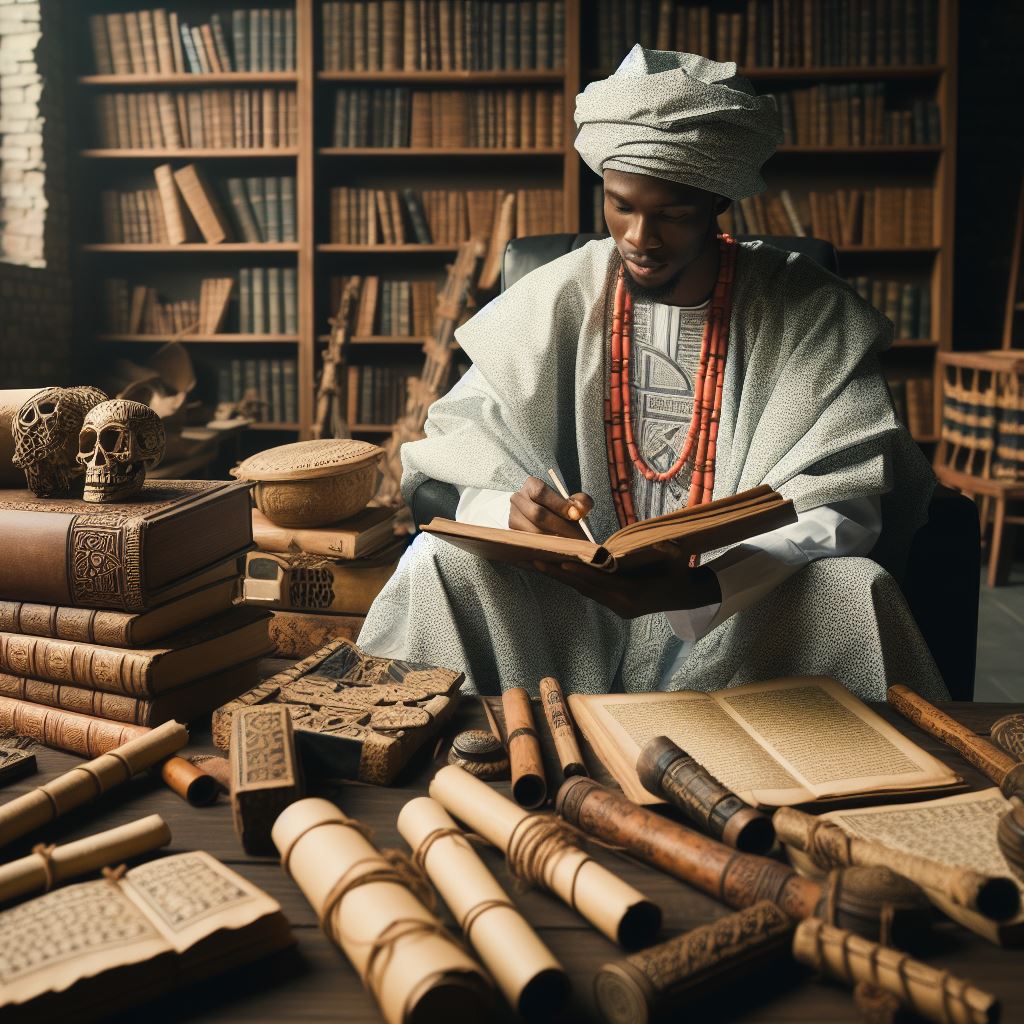Introduction
Anthropology, a multifaceted discipline, encompasses the study of human societies, cultures, and behaviors across diverse contexts.
It delves into the intricacies of human existence, exploring social structures, cultural practices, and biological adaptations throughout history and across geographical boundaries.
Understanding anthropology is not merely an academic pursuit but a fundamental aspect of comprehending the complexities of human diversity, history, and evolution.
The significance of studying anthropology extends beyond academia, permeating various aspects of contemporary society.
By unraveling the nuances of human culture and behavior, anthropology provides valuable insights into contemporary issues such as globalization, migration, and cultural diversity.
Moreover, it fosters cross-cultural understanding, promotes empathy, and challenges ethnocentrism.
Throughout this blog post, we will delve into the key principles, methodologies, and subfields of anthropology.
From cultural anthropology to archaeology, linguistic anthropology to biological anthropology, each subfield offers unique perspectives on the human experience.
By exploring these topics, we aim to provide a comprehensive overview of anthropology and its relevance in today’s world.
History of Anthropology
Anthropology is a discipline that has evolved over time, with its origins dating back to the 19th century.
Origins of Anthropology as a Discipline
The roots of anthropology can be traced back to scholars like Edward Burnett Tylor and Lewis Henry Morgan.
Tylor is known for his contributions to the concept of cultural evolution and the idea of cultural universals.
Morgan, on the other hand, is recognized for his work on kinship and social structure in indigenous societies.
These anthropologists laid the foundation for the development of the field and helped shape its focus on studying human societies.
Major Contributors to the Field
Throughout its history, anthropology has seen numerous individuals who have made significant contributions to the field.
One of the most influential figures in anthropology is Franz Boas, known as the “Father of American Anthropology.”
Boas advocated for cultural relativism and the importance of fieldwork in anthropological research.
Another key figure is Margaret Mead, whose work on gender and sexuality challenged traditional Western beliefs about these topics.
Claude Lévi-Strauss, a French anthropologist, is known for his structuralist approach to anthropology and his studies on kinship systems.
Evolution of Anthropological Theories and Methodologies
Anthropology has undergone significant changes in both its theoretical frameworks and research methodologies over time.
Early anthropological theories focused on cultural evolution, which posited that societies evolve from simple to complex forms over time.
Later, structural functionalism emerged, emphasizing the interconnectedness of social institutions within a society.
In the mid-20th century, cultural anthropology saw a shift towards interpretive approaches, focusing on understanding the meanings embedded in cultural practices.
Today, anthropology encompasses a wide range of theoretical perspectives, including postmodernism, feminist anthropology, and postcolonial theory.
Methodologically, anthropology has also evolved, with the adoption of participant observation, interviews, and other qualitative research methods.
Overall, anthropology continues to be a dynamic and diverse field, with ongoing debates and new perspectives shaping its ever-evolving nature.
Read: Comparing Communication Arts and Mass Communication
Subfields of Anthropology
Anthropology, a multifaceted discipline, encompasses various subfields, each offering unique insights into humanity.
Cultural Anthropology
Cultural anthropology delves into the study of human cultures, societies, and customs across different contexts. It examines the beliefs, rituals, and practices that define cultural identities.
Physical Anthropology
Physical anthropology focuses on the biological aspects of humanity, exploring topics such as human evolution, genetics, and biological variation.
It investigates the anatomical, genetic, and behavioral characteristics of humans and their primate relatives.
Archaeology
Archaeology is the study of past human societies through the analysis of material remains such as artifacts, structures, and landscapes.
It reconstructs ancient civilizations, traces human development, and interprets the cultural dynamics of prehistoric societies.
Linguistic Anthropology
Linguistic anthropology explores the role of language in shaping human societies and cultures.
It investigates language diversity, communication patterns, and the social, cultural, and cognitive aspects of language use.
Understanding anthropology’s diverse subfields is crucial for gaining a comprehensive understanding of humanity.
Cultural anthropology provides insights into the diversity of human cultures and societies, shedding light on social norms, practices, and worldviews.
Physical anthropology helps us trace our evolutionary origins, understand human biological diversity, and explore the adaptations of human populations to different environments.
Archaeology allows us to uncover the material traces of past societies, reconstruct their lifeways, and analyze the cultural changes that have shaped human history.
Linguistic anthropology reveals how language reflects and influences social interactions, cultural practices, and cognitive processes.
The importance of anthropology extends beyond academic inquiry, impacting various aspects of contemporary society.
By examining the cultural, biological, and linguistic dimensions of humanity, anthropology contributes to cross-cultural understanding, social cohesion, and global awareness.
It provides insights into pressing issues such as globalization, migration, environmental sustainability, and social justice.
Essentially, anthropology serves as a vital tool for exploring the complexities of human existence.
Through its diverse subfields, anthropology offers invaluable insights into the diversity, history, and evolution of human societies.
Embracing anthropology’s interdisciplinary approach enables us to appreciate the richness of human diversity, address global challenges, and promote empathy, understanding, and informed perspectives in our increasingly interconnected world.
Read: Language Arts Courses: What to Expect in Nigeria
Basic Concepts in Anthropology
Anthropology is the study of humans, past and present, in all their diversity.
Culture
Culture encompasses the shared beliefs, values, customs, and knowledge that characterize a society.
Society
Society refers to a group of individuals who share a common culture, interact with one another, and form a community.
Ethnography
Ethnography is the systematic study of people and cultures through fieldwork and observation.
Cultural Relativism
Cultural relativism is the belief that all cultural practices should be understood on their own terms, without judgment.
Anthropologists strive to understand cultural differences and strive to promote tolerance and understanding.
They seek to unravel the complexities of human societies, exploring how culture influences social structures and behaviors.
Through ethnographic research, anthropologists immerse themselves in unfamiliar cultures to gain insights into different ways of life.
By studying societies around the world, anthropologists shed light on the shared human experience while celebrating diversity.
Anthropology helps us appreciate the complexity of human societies and challenges us to question our assumptions about other cultures.
It encourages us to embrace diversity, understanding that there are many valid ways of being in the world.
Overall, anthropology provides valuable insights into what it means to be human, highlighting our interconnectedness and shared humanity.
Basically, the basic concepts in anthropology – culture, society, ethnography, and cultural relativism – are essential to understanding the complexities of human existence.
By exploring these concepts, we gain a deeper appreciation for the diversity of human cultures and the interconnectedness of all societies.
Anthropology challenges us to question our assumptions and biases, promoting tolerance, empathy, and cultural understanding.
Transform Your Career with Expert Guidance
Get personalized mentorship consulting that’s tailored to your unique path. Our expert advice is actionable and exclusive.
Get StartedThrough the study of anthropology, we can learn to appreciate the beauty of cultural differences while recognizing our shared humanity.
Read: Digital Media Trends in Communication Arts

Importance of Anthropology in Society
Anthropology offers insights into human diversity, examining cultural, biological, and linguistic aspects worldwide.
Understanding Human Diversity
Anthropology explores the myriad ways in which humans adapt, innovate, and express themselves within diverse cultures.
Addressing Global Issues
Anthropologists analyze global challenges like migration, climate change, and social inequality from interdisciplinary perspectives.
Impact on Public Policy and Social Justice
Anthropological research informs policies promoting cultural sensitivity, human rights, and equitable development worldwide.
Anthropology’s holistic approach enables us to understand and appreciate the complexity of human experiences.
By studying diverse cultures, anthropologists foster cross-cultural understanding and respect.
Their insights into human behavior and social dynamics contribute to addressing global challenges such as poverty, discrimination, and environmental degradation.
Additionally, anthropologists advocate for marginalized communities, promoting social justice and equity through their research and activism.
Through anthropological research, policymakers gain valuable insights into the cultural contexts of their constituents, enabling them to develop more effective and culturally sensitive policies.
By incorporating anthropological perspectives into policymaking, governments can better address the needs and aspirations of diverse populations.
Furthermore, anthropologists collaborate with local communities to ensure that policies are inclusive and respectful of cultural traditions and values.
Generally, anthropology plays a vital role in understanding human diversity, addressing global issues, and promoting social justice.
By examining the complexities of human societies and cultures, anthropologists contribute to building a more inclusive, equitable, and sustainable world for all.
Through their research, advocacy, and engagement with policymakers, anthropologists strive to create positive change and foster greater understanding and respect among diverse peoples and communities.
Read: How to Apply for Communication Arts Programs
Career Opportunities in Anthropology
When considering a career in anthropology, there are several avenues that individuals can explore to apply their knowledge and skills. Below are some of the career opportunities in anthropology:
Anthropology, a multidisciplinary field, is essential for understanding human diversity, addressing global issues, and promoting social justice.
Understanding Human Diversity
Anthropology studies cultural, biological, and linguistic variations among humans, fostering appreciation for diverse ways of life.
Addressing Global Issues
Anthropologists analyze pressing global challenges such as climate change, migration, and poverty from diverse perspectives.
Impact on Public Policy and Social Justice
Anthropological research informs policymaking, advocating for inclusive policies that respect cultural diversity and promote social equality.
Anthropology’s holistic approach enables us to understand the complexities of human experiences.
By studying diverse cultures, anthropologists foster cross-cultural understanding and respect.
Their insights into human behavior and social dynamics contribute to addressing global challenges such as poverty, discrimination, and environmental degradation.
Additionally, anthropologists advocate for marginalized communities, promoting social justice and equity through their research and activism.
Through anthropological research, policymakers gain valuable insights into the cultural contexts of their constituents, enabling them to develop more effective and culturally sensitive policies.
By incorporating anthropological perspectives into policymaking, governments can better address the needs and aspirations of diverse populations.
Furthermore, anthropologists collaborate with local communities to ensure that policies are inclusive and respectful of cultural traditions and values.
Therefore, anthropology plays a vital role in understanding human diversity, addressing global issues, and promoting social justice.
By examining the complexities of human societies and cultures, anthropologists contribute to building a more inclusive, equitable, and sustainable world for all.
Through their research, advocacy, and engagement with policymakers, anthropologists strive to create positive change and foster greater understanding and respect among diverse peoples and communities.
Conclusion
In the intricate tapestry of human existence, anthropology serves as a guiding light, illuminating the myriad facets of our collective journey.
Through its lens, we peer into the diverse landscapes of culture, biology, and language, uncovering the essence of human diversity.
As we draw this exploration to a close, let us reflect on the profound significance of anthropology.
It is not merely a field of study but a gateway to empathy, understanding, and interconnectedness.
By delving into its depths, we embark on a transformative journey of self-discovery and enlightenment.
I implore each reader to embrace the spirit of curiosity and embark on their own anthropological odyssey.
Dive into the rich literature, engage with communities, and ponder the complexities of human society.
By integrating anthropological concepts into our daily lives, we cultivate a deeper appreciation for the mosaic of humanity.
Together, let us heed the call to action, embracing anthropological insights as catalysts for positive change.
By fostering dialogue, challenging assumptions, and promoting inclusivity, we can create a more equitable and harmonious world.
In the grand tapestry of existence, anthropology is the thread that binds us all.
Let us weave it into the fabric of our lives, enriching our understanding and shaping a brighter future for generations to come.f




